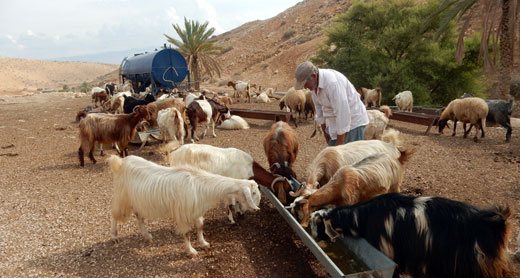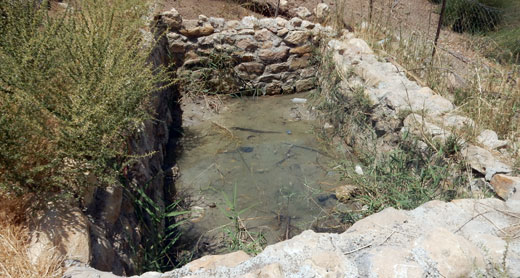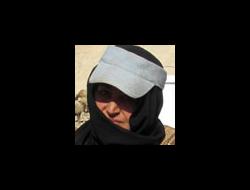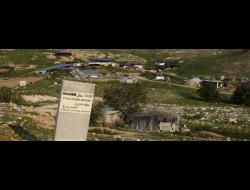Palestinians living in the West Bank suffer from a water shortage due to Israeli policy that limits water supply throughout the year, and more so during the summer months. The shortage is particularly acute in communities that live in Area C and are unrecognized by Israel, and therefore, are not able to connect to the water supply system. Many of these communities live in the Jordan Valley, in close proximity to Israeli water drills. Their residents, who in some cases live just a few meters away from Israeli drilling and pumping stations, watch with desperation as water flows almost exclusively to the settlements in the area, while they are forced to procure water by other, much more complicated and much more expensive means. These means include purchasing water tanks at triple or more the cost paid by Israelis, who are connected to Mekorot (Israel’s national water company ), and hauling them by tractor; collecting rain water; or pumping from natural springs and reservoirs. Residents face obstacles with these alternatives as well, as the Israeli authorities confiscate equipment and block access to natural water sources.

Shepherd ‘Abd a-Rahman Khalil with his flock last year. Photo: 'Aref Daraghmeh, B'Tselem, 28 Oct. 2015
An incident that took place last week illustrates the serious harm that Israel routinely inflicts on residents of the Jordan Valley as it abuses its powers. On Tuesday, 14 June 2016, the temperature recorded in the Jordan Valley surpassed 40°C (104°F). Nonetheless, Civil Administration personnel seized a tractor that was hauling a water tank in the Palestinian community of Khirbet Samrah, and left a demolition order for water reservoirs built by residents in the area of Khirbet al-Malih . In testimonies given to B’Tselem field researcher Aref Daraghmeh the next day, area residents described how the water shortage impacts their lives and the difficulties they encounter obtaining water.
Muhammad Abu ‘Awad, 59, who lives with his family in Khirbet Samrah, spoke of the hardship that the water shortage causes his family, who make their living from shepherding, and about the confiscation of the family’s tractor and water tank:
We graze our flock in an open field, close to the military camp north of the settlement of Ro’i, because that’s where there is grass. We bring along a tractor hauling a water tank so the flock can drink. We get the water from faraway places like ‘Ein al-Beida and Kardalah, and it costs more than 20 shekels (5 USD) per cubic meter. The large water tanker can reach the area where we live, but not the grazing fields, so we have to haul the water there ourselves. On Tuesday, we were out grazing the flock with the tractor when suddenly a car drove up with a Civil Administration officer. He stopped the tractor. They confiscated it and took it to the military camp. This tractor is like an extra limb for me. I can’t give our flock water without it.
I don’t know what to do. The area close to where we live is already dried up and there’s nothing there. I might have to take the flock back to the pens and buy animal feed, but it’ll bankrupt me. I might have to sell some of it. Everyone in the area is afraid of the confiscations and no one will lend me their tractor. A lot of people have gone through what I’ve gone through. The Civil Administration has confiscated a lot of tanks and tractors and people have had to pay fines and undertake not to come to the area in order to get them back. These methods are aimed at harming our livelihoods. We live here to provide for our families. Nothing more. It’s not an issue of a military zone. They don’t want us to live here. The Mekorot water lines go right by our tents and shacks, bringing water to the settlements and military bases – so why not us, too?

Spring water reservoir slated for demolition in Khirbet al-Malih. Photo: 'Aref Daraghmeh, B'Tselem, 14 June 2016
‘Abd a-Rahman Khalil, 70, a resident of Khirbet al-Malih, describes the water shortage suffered by residents of the area and the demolition orders issued by the military for water reservoirs built by the residents:
About six years ago, the local council restored two springs here, in the al-Malih area. They cleaned them and fenced them in to keep away animals that contaminate the water. We were overjoyed. Suddenly we had a little bit of water, which reduced the need to buy water at high prices. We used the water from the springs for our household needs and for our flocks. On Tuesday, 14 June 2016, Civil Administration people came and left notices that they plan to demolish the two water reservoirs at the springs. If they do, it will be a disaster, because most people in the area rely on this water for the flocks and for their family consumption.
The Civil Administration and the military have already blocked off a lot of springs in the area and now they want to complete the job by harming these two reservoirs. We have no running water and no other water sources in the area. Our living conditions are hard and we have to buy the water at high prices. Sometimes, a cubic meter costs more than 23 shekels (6 USD) and even then, we don’t always have vehicles available to haul the water home. I don’t know what will become of people here. Some of them have nothing to eat. If they destroy the two reservoirs and people will rely only on buying water, those who stay here will have to take out loans or sell off some of their flocks. If they had any human decency, they’d let us hook up to the water pipes that run a meter from our tents. We can hear the water flowing through the pipes. The kids put their ears to the pipes and listen, but they can’t get a glass of water.


